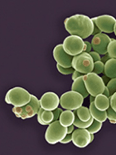
Annual Review of Food Science and Technology
Scope & Guideline
Transforming Food Science Through Comprehensive Reviews
Introduction
Aims and Scopes
- Food Processing and Technology Innovations:
The journal explores cutting-edge technologies in food processing, including nonconventional methods and the use of bioactive compounds to enhance food quality and safety. - Nutritional Science and Health Benefits:
Research highlighting the health implications of food components, dietary patterns, and their effects on human health, such as the role of phytochemicals and probiotics. - Sustainability and Environmental Impact:
A focus on sustainable practices in food production, including life cycle assessments, alternative protein sources, and the reduction of fossil fuel use in food manufacturing. - Functional Foods and Nutraceuticals:
Investigating the development and utilization of functional foods that provide health benefits beyond basic nutrition, including bioactive compounds and their mechanisms. - Microbial and Fermentation Technologies:
The journal covers advancements in fermentation technologies, the role of microorganisms in food safety, and the development of novel fermented food products. - Food Safety and Quality Assurance:
Research on methods to enhance food safety, including the use of biosensors, antimicrobial treatments, and understanding the microbiome's role in food safety.
Trending and Emerging
- Plant-Based and Alternative Proteins:
There is a growing body of research focused on plant-based proteins and alternative sources like cultured meat, reflecting consumer demand for sustainable protein options. - Microbiome and Gut Health:
An increasing emphasis on the gut microbiome's role in health and nutrition is evident, with studies exploring how dietary components influence microbial communities. - Digitalization in Food Systems:
Emerging themes around the integration of digital technologies in food production, processing, and supply chains are becoming prominent, indicating a trend towards smarter food systems. - Functional Ingredients and Health Promotion:
Research into bioactive compounds and their health benefits is on the rise, highlighting the potential of functional foods to prevent diseases and enhance well-being. - Sustainable Food Practices:
The focus on sustainability, including eco-friendly food production and waste reduction strategies, is increasingly significant in the journal's publications.
Declining or Waning
- Traditional Food Preservation Techniques:
Research focusing on conventional methods of food preservation has diminished, likely due to the increasing interest in innovative and nontraditional preservation technologies. - Animal-Based Protein Sources:
The focus on traditional animal-based proteins has waned as the journal increasingly highlights plant-based alternatives and sustainable protein sources. - Basic Food Chemistry:
While foundational food chemistry remains important, there has been a noticeable shift toward applied research that emphasizes health benefits and technological innovations. - Conventional Food Safety Practices:
The emphasis on traditional food safety practices has decreased, as newer methodologies utilizing technology and data-driven approaches gain more attention. - Generalized Dietary Recommendations:
General dietary guidelines are becoming less prominent as the journal highlights personalized nutrition and the microbiome's role in health outcomes.
Similar Journals
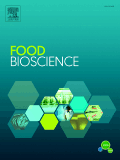
Food Bioscience
Unlocking Knowledge for Tomorrow's Food ChallengesFood Bioscience is a leading peer-reviewed journal published by Elsevier, dedicated to advancing the understanding of the complex interplay between food science and biosciences. With an impressive Impact Factor that places it in the Q1 and Q2 quartiles for Food Science and Biochemistry respectively, the journal consistently ranks among the top publications in its field, reflected in its Scopus rankings (Rank #83/389 in Food Science and Rank #175/438 in Biochemistry). Since its inception in 2013, Food Bioscience has fostered a multidisciplinary approach, bridging gaps between research in agricultural, biological, and food sciences, thus encouraging innovative solutions to the pressing challenges facing the global food supply chain. Although it currently operates under a subscription model, the journal is committed to disseminating high-quality research, making significant contributions to both academic scholarship and industry practices. Researchers, professionals, and students alike are invited to explore the wealth of knowledge contained within its pages as it plays a pivotal role in shaping the future of food bioscience.

Food Chemistry-X
Pioneering Research for a Healthier Tomorrow.Food Chemistry-X is a premier open-access journal published by Elsevier, dedicated to advancing the field of food chemistry through high-quality research and comprehensive reviews. With its ISSN of 2590-1575, the journal has gained significant attention since adopting an open-access model in 2019, allowing wide dissemination of knowledge and innovations in food science. Based in the United Kingdom, it holds prestigious Q1 rankings in both Analytical Chemistry and Food Science categories as of 2023, positioning itself as a leading platform for researchers worldwide. The journal's focus spans extensive topics within food chemistry, including food safety, nutritional analysis, and the chemical properties of food, offering insights that are crucial for addressing contemporary challenges in food production and consumption. With a Scopus rank placing it in the 65th percentile among the top journals in Food Science and the 58th percentile in Analytical Chemistry, Food Chemistry-X is an essential resource for academics, professionals, and students seeking to stay at the forefront of research and innovation in this vibrant field.

Current Research in Food Science
Connecting Researchers in the Realm of Food ScienceCurrent Research in Food Science is a leading peer-reviewed academic journal published by Elsevier, specializing in the dynamic field of food science. Since its transition to an Open Access model in 2019, the journal has broadened its reach, contributing significantly to the dissemination of high-quality research. With strong rankings, including a Q1 quartile status in Applied Microbiology and Biotechnology, Biotechnology, and Food Science, it stands out as a pivotal resource for scholars. Based in the Netherlands, current research published within its pages spans a wide range of relevant topics, ensuring that researchers and practitioners stay abreast of the latest advancements. The journal's impressive Scopus rankings enhance its credibility, with a percentile standing in the 74th to 83rd range across relevant categories, underscoring its impact and importance in the academic community. Current Research in Food Science aims to foster the exchange of innovative ideas and foster collaborative efforts among researchers, making it an essential resource for those engaged in advancing the science and technology of food.

Journal of Food and Nutrition Research
Pioneering Insights for a Healthier Food FutureJournal of Food and Nutrition Research, published by the VUP FOOD RESEARCH INST in Bratislava, Slovakia, serves as a vital platform for disseminating cutting-edge research in the fields of food science and nutrition. With an ISSN of 1336-8672 and an E-ISSN of 1338-4260, this journal emphasizes the importance of interdisciplinary approaches to address contemporary challenges related to food quality, dietary practices, and nutritional health. Notably recognized in the 2023 Scopus rankings, the journal is classified in Q3 quartiles for both Food Science and Nutrition & Dietetics, providing a forum for researchers aiming to enhance knowledge and practices within these domains. Those engaged in academia and industry will find the journal invaluable for its comprehensive scope, which covers novel food technologies, nutrition interventions, and the implications of dietary behaviors. Though not open access, the journal is dedicated to enriching the academic conversation and contributing to advancements in public health and nutrition policies.

eFood
Connecting researchers to the forefront of food science.eFood is a pioneering journal in the field of food science, published by the esteemed WILEY. With its impactful emergence, the journal has rapidly established itself within the academic community, evidenced by its impressive Q1 category ranking in Food Science as of 2023, and a commendable position at Rank #95 out of 389 in the Scopus database. Covering a wide spectrum of topics related to food innovation, technology, safety, and nutrition, eFood serves as an indispensable platform for researchers, industry professionals, and students who are at the forefront of advancing our understanding of food systems. The journal notably operates with an open-access model, promoting wide dissemination of knowledge while enhancing the visibility of high-quality research. As we look forward to converging years from 2020 to 2024, eFood is poised to foster rigorous scientific discourse and contribute significantly to the future of food science research.

CZECH JOURNAL OF FOOD SCIENCES
Exploring Innovative Solutions for Food Safety and TechnologyCzech Journal of Food Sciences is a premier publication in the field of food science, disseminating vital research since its inception in 1999 and transitioning to Open Access in 2007. Published by the Czech Academy Agricultural Sciences, this journal facilitates the exchange of knowledge among researchers, professionals, and students dedicated to advancing the understanding of food systems, safety, and technology. With an ISSN of 1212-1800 and an E-ISSN of 1805-9317, it holds a respectable position with a Q3 ranking in the Food Science category for 2023, illustrating its commitment to high-quality research despite its Scopus rank of 209 out of 389, situated in the 46th percentile. Located in the heart of the Czech Republic, at TESNOV 17, PRAGUE 117 05, this journal serves as an essential resource for those involved in agricultural and biological sciences, paving the way for innovative discoveries and applications in food science.
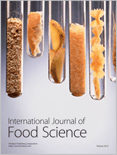
International Journal of Food Science
Fostering Collaboration in Food Science ResearchThe International Journal of Food Science, published by HINDAWI LTD, stands as a crucial platform for advancing knowledge within the realm of food science. Established in 2013, this Open Access journal based in Egypt has garnered significant recognition, achieving an impressive Q2 classification in the 2023 Food Science category, which reflects its commitment to quality and impactful research. With a Scopus rank of #88 out of 389 in Agricultural and Biological Sciences and placing in the 77th percentile, this journal serves as an essential resource for researchers, professionals, and students dedicated to innovative developments and scientific exploration in food science. The journal not only provides unrestricted access to valuable research but also aims to foster collaboration and dissemination of knowledge on critical issues affecting food safety, nutrition, and technology. For those looking to keep abreast of the latest advancements, the International Journal of Food Science is certainly an indispensable addition to their academic pursuits.

Applied Food Biotechnology
Pioneering research for sustainable food solutions.Applied Food Biotechnology is a dynamic and engaging open-access journal dedicated to the interdisciplinary field of food biotechnology, published by Shahid Beheshti University of Medical Sciences, Faculty of Medicine. Since its inception in 2014, this journal has provided a platform for the dissemination of cutting-edge research that combines aspects of applied microbiology, biotechnology, and food science, significantly contributing to advancements in food safety, processing, and nutritional enhancement. With an impressive impact factor, the journal ranks Q3 in multiple relevant categories, including Applied Microbiology and Biotechnology, Biotechnology, and Food Science in 2023, highlighting its influence within these fields. The journal's scope encourages innovative studies that investigate the utilization of biological processes in food technology, aiming to foster both scientific inquiry and practical applications across diverse demographics. With its commitment to open access, Applied Food Biotechnology ensures that all research findings are readily available to researchers, professionals, and students globally, enhancing collaboration and knowledge sharing. Located in Tehran, Iran, this journal serves as a vital resource for anyone invested in the future of food biotechnology.
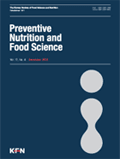
Preventive Nutrition and Food Science
Exploring the Intersection of Nutrition and Public HealthPreventive Nutrition and Food Science, an esteemed journal published by the Korean Society of Food Science and Nutrition, serves as a pivotal platform for the dissemination of innovative research and insights in the fields of food science, nutrition, and dietetics. With an ISSN of 2287-1098 and an E-ISSN of 2287-8602, this journal is dedicated to advancing knowledge from 2012 through 2024, showcasing contributions that reflect the interplay between nutrition, health, and preventive strategies. Indexed in Scopus, it proudly holds a Q2 ranking in Food Science and a Q3 ranking in Nutrition and Dietetics as of 2023, positioning it among influential publications within these disciplines. Researchers, professionals, and students can explore cutting-edge studies that contribute significantly to evidence-based practices, enhancing public health and nutritional care. Although it operates under a subscription model, the journal plays a crucial role in fostering a deeper understanding of preventive nutrition, advocating for advancements that address contemporary dietary challenges.
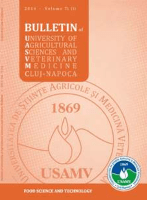
Bulletin of University of Agricultural Sciences and Veterinary Medicine Cluj-Napoca-Food Science and Technology
Elevating Research in Agricultural Sciences and Food InnovationBulletin of University of Agricultural Sciences and Veterinary Medicine Cluj-Napoca - Food Science and Technology is a prominent peer-reviewed journal dedicated to advancing the field of food science and technology. Published by the University of Agricultural Sciences and Veterinary Medicine Cluj-Napoca, this open-access journal has been serving the academic community since 2013, promoting the dissemination of high-quality research that addresses pressing issues in food safety, quality, and innovation. With its ISSN 2344-2344 and E-ISSN 2344-5300, the journal aims to bridge the gap between academia and industry by providing a platform for scholars and practitioners to share their findings, insights, and methodologies. Situated in the heart of Romania, the journal reflects the country's rich agricultural heritage and its commitment to enhancing global food systems. By maintaining a rigorous editorial standard, the Bulletin ensures that it remains a vital resource for researchers, industry professionals, and students who are keen to explore the latest developments in food science.